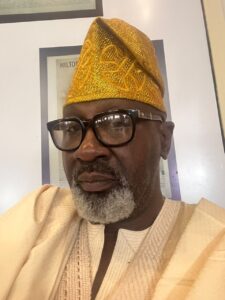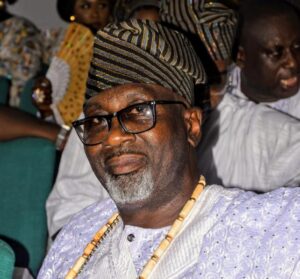We are dedicated to building a thriving Nigeria as we embrace the 2012 Oronsaye report, in line with the vision of Tinubu – Abayomi Odunowo
The decision by President Bola Tinubu to order the full implementation of the Stephen Oronsaye report marks a significant step towards achieving a leaner and more efficient government. The Oronsaye report, which was submitted twelve years ago, proposed the merging of some government agencies and the scrapping of others in order to streamline operations and reduce redundancy. Despite the issuance of a white paper two years after the report was submitted, the full implementation of its recommendations has been delayed until now.
The implementation of the Oronsaye report reflects President Tinubu’s commitment to improving governance and eliminating wasteful spending. By reducing the number of government agencies and parastatals, the administration aims to enhance efficiency, cut costs, and improve service delivery to the Nigerian people. This decision also demonstrates a willingness to embrace change and adapt to the evolving needs of the country.
As the government moves forward with the implementation of the Oronsaye report, it is crucial to ensure that the process is transparent and inclusive. Stakeholders should be engaged in the restructuring and rationalization of government agencies to mitigate any potential negative impacts and ensure a smooth transition. Ultimately, the full implementation of the Oronsaye report has the potential to create a more agile and responsive government that is better equipped to address the needs of the Nigerian people.
Government agencies play a crucial role in the implementation of policies, delivery of services, and the overall functioning of the government. However, over time, many agencies have become redundant, overlapping in their functions, and inefficient in their operations. In a bid to streamline the government and make it more efficient, the Minister of Information and National Orientation, Mohammed Idris, recently announced that many agencies will be scrapped and many others will be merged. This move, according to the minister, is aimed at paving way for a leaner government, one that is more effective and cost-efficient.
The decision to implement the so-called Orosanye Report, named after the former head of the Presidential Committee on the Rationalization and Restructuring of Federal Government Parastatals, Commissions and Agencies, is a bold move by the current administration under the leadership of President Bola Ahmed Tinubu. The report, which was submitted in 2014, recommended the reduction of the number of government agencies from 263 to 161, through mergers, scrapping, or reorganization of existing agencies.
The rationalization of government agencies is not a new concept, as governments all over the world have periodically reviewed and restructured their bureaucracies to eliminate duplication, reduce costs, and improve performance. In Nigeria, the need for such a review is even more pressing, given the proliferation of government agencies over the years, leading to a bloated and inefficient public sector.
The decision to scrap or merge agencies is not without its challenges, as it involves significant political, economic, and administrative considerations. However, the benefits of a leaner government are manifold. Firstly, it will result in cost savings for the government, as redundant agencies are eliminated, and overlapping functions are consolidated. This will free up resources that can be redirected towards more critical areas such as infrastructure development, social services, and poverty alleviation programs.
Additionally, a leaner government will lead to improved efficiency and coordination in the delivery of public services. With fewer agencies, there will be less bureaucracy, clearer lines of authority, and better oversight, leading to faster decision-making and more responsive governance. This will ultimately improve the overall functioning of the government and enhance its capacity to meet the needs of the citizens.
Furthermore, the rationalization of government agencies will also promote greater accountability and transparency. With fewer agencies, it will be easier for the government to monitor and evaluate their performance, ensuring that they are delivering on their mandates and using public funds effectively. This will help to reduce corruption and inefficiency, which have often been associated with the proliferation of government agencies.
It is important to note that while the decision to scrap or merge agencies is necessary, it should be done with caution and sensitivity. The impact on the employees of the affected agencies should be carefully considered, with measures put in place to ensure that their interests are protected. Additionally, the functions and mandates of the affected agencies should be thoroughly reviewed, to ensure that critical services are not compromised in the process of rationalization.
The decision to scrap and merge government agencies to pave way for a leaner government is a commendable move by the current administration. It reflects a commitment to improving governance, reducing waste, and enhancing service delivery. While the process of rationalization will undoubtedly be challenging, the long-term benefits are well worth the effort. A leaner government will not only lead to cost savings and improved efficiency but also promote greater accountability and transparency. With careful planning and implementation, the rationalization of government agencies can contribute to the overall development and progress of the nation.
In the coming twelve weeks, the Nigerian government is embarking on a significant overhaul of its administrative structure. This decision, initiated by the Secretary to the Governor, aims to streamline government operations and reduce the overall cost of governance. It involves a comprehensive review of existing agencies, commissions, and departments, with the goal of either scrapping, merging, or reassigning them to better optimize their functions within the government.
This process, which will be overseen by a dedicated committee, demands thorough legal and regulatory frameworks work to ensure a smooth transition. The timeline for this transformation is ambitious, and it underscores the urgency and determination behind this initiative.
At its core, this decision is aimed at fine-tuning and restructuring government operations as a whole. The objective is to create a more efficient and effective administrative system that can better serve the needs of the Nigerian people. By eliminating redundancies, consolidating overlapping functions, and reassigning entities to more suitable ministries, the government seeks to optimize its resources and enhance its overall effectiveness.
The decision to reduce the number of agencies, commissions, and departments is a clear demonstration of the government’s commitment to rationalizing its administrative apparatus. By streamlining these entities, the government aims to eliminate unnecessary bureaucracy and improve overall governance. This move is in alignment with President Bola Ahmed Tinubu’s directive to reduce the cost of governance—a critical objective in light of the economic challenges facing the country.
The comprehensive nature of this decision cannot be overstated. It requires careful consideration of legal, regulatory, and operational implications. As such, the committee overseeing this process must work diligently to address the various complexities and challenges that may arise during the restructuring.
Moreover, the timeline of twelve weeks adds a sense of urgency to this initiative. It signifies the government’s commitment to swift and decisive action, demonstrating its determination to effect real change within a relatively short timeframe.
In conclusion, the decision to restructure government operations in Nigeria is a far-reaching and ambitious endeavor. It reflects a strong commitment to improving governance, reducing bureaucracy, and optimizing resources. As the committee works towards the completion of this process within the stipulated timeline, its efforts will be instrumental in shaping the future of government administration in Nigeria.
Otunba Abdulfalil Abayomi Odunowo
National Chairman AATSG
27th February, 2024.
Do you have any information or event for Epinews to publish or cover? Kindly Call us on +2349053535322 or send us message on Whatsapp number +2349053535322 or send us an email here










